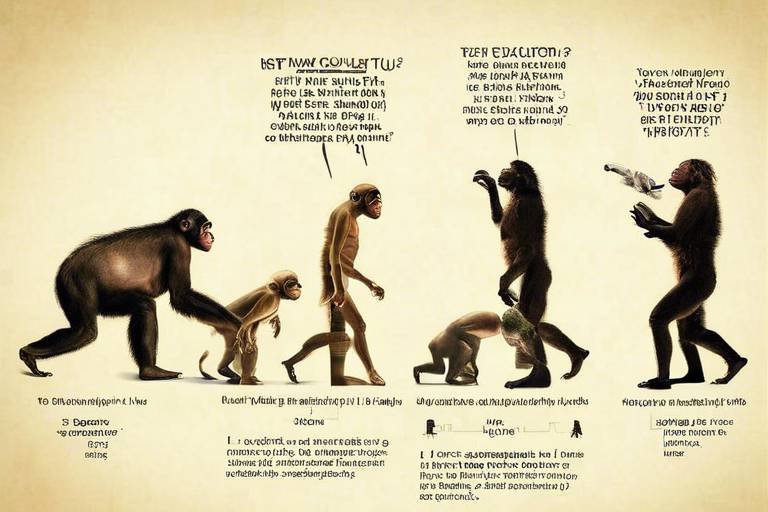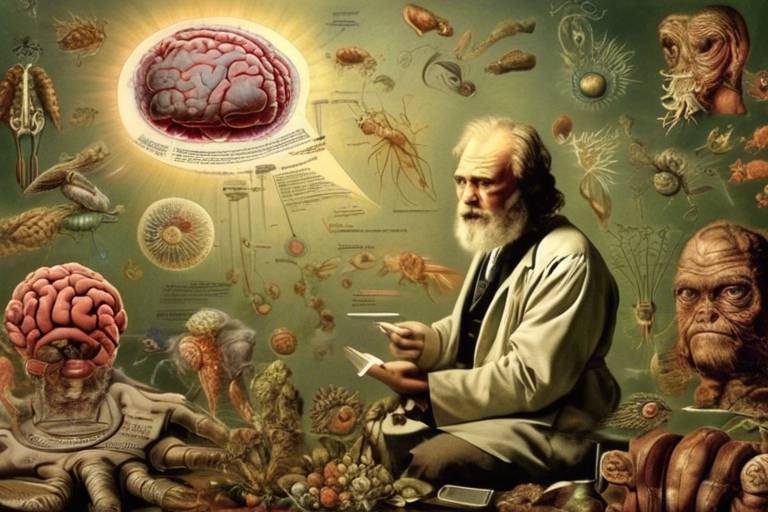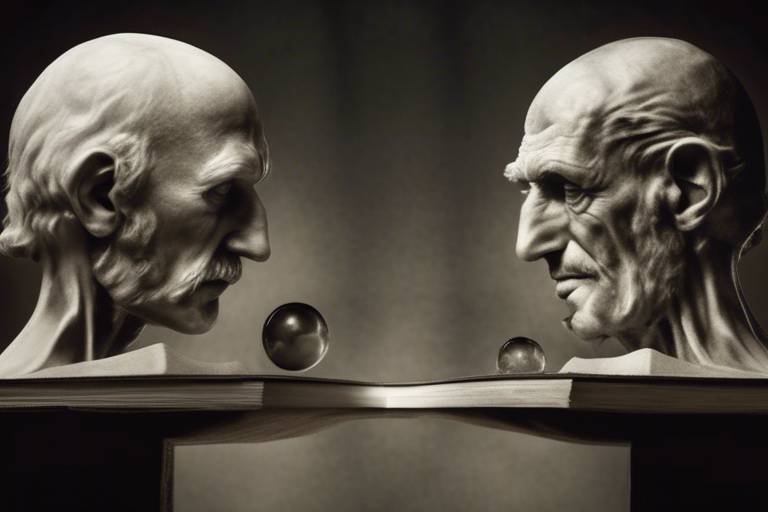Does Scientific Method Have Its Roots in Greek Philosophy?
The exploration of the scientific method's origins is a fascinating journey that leads us back to the ancient world, specifically to the rich intellectual traditions of Greek philosophy. Have you ever wondered how we transitioned from mythological explanations of the universe to a structured approach to inquiry? This transformation was not just a simple leap; it was a profound shift in human thought that laid the groundwork for modern science. Greek philosophers such as Socrates, Plato, and Aristotle played pivotal roles in this evolution, each contributing unique insights that shaped our understanding of knowledge and inquiry. Their emphasis on reason, observation, and systematic thinking created a framework that still influences scientific practices today.
At the heart of this philosophical movement was a quest for knowledge that was grounded in rationality rather than superstition. Imagine a time when explanations for natural phenomena were steeped in mythology; the sun was merely a chariot driven by a god. Greek philosophers challenged these notions, advocating for a more logical approach. They asked questions like, "What can we observe?" and "How can we explain what we see?" This shift was monumental, as it encouraged individuals to seek answers through observation and reason, laying the foundation for what we now recognize as the scientific method.
As we delve deeper into the contributions of these philosophers, we start to see how their ideas interweave, creating a rich tapestry of thought that spans centuries. For instance, Socrates introduced the method of questioning known as the Socratic Method, which emphasized dialogue and critical thinking. This technique encouraged students to question their assumptions and explore ideas more deeply, fostering a culture of inquiry that is essential to scientific exploration. Plato, on the other hand, expanded on these ideas by introducing the concept of forms or ideals, suggesting that the material world is a reflection of a higher reality. His emphasis on abstract thinking and ideal forms laid the groundwork for future philosophical debates about the nature of reality and knowledge.
However, it was Aristotle who truly revolutionized scientific thought with his systematic approach to observation and classification. He moved beyond abstract ideals to focus on the tangible world around us. Aristotle’s insistence on empirical observation marked a significant departure from his predecessors. He believed that knowledge should be derived from the senses, a principle that resonates strongly with the scientific method we use today. His work in biology, physics, and ethics showcased the importance of categorizing knowledge and understanding the natural world through careful observation and analysis.
In conclusion, the roots of the scientific method are deeply embedded in Greek philosophy. The shift from mythological to rational explanations set the stage for centuries of inquiry and discovery. As we continue to explore the contributions of these ancient thinkers, it becomes increasingly clear that their legacy is not just a historical footnote but a living, breathing part of our scientific practices today. So, the next time you conduct an experiment or analyze data, remember that you are part of a long tradition of inquiry that began in ancient Greece.
- What is the scientific method? The scientific method is a systematic approach to inquiry that involves observation, hypothesis formation, experimentation, and analysis.
- How did Greek philosophers influence the scientific method? Greek philosophers emphasized rational inquiry, observation, and classification, which are foundational to the scientific method.
- Who were the key figures in Greek philosophy related to science? Key figures include Socrates, Plato, and Aristotle, each contributing unique perspectives that shaped scientific thought.
- Is the scientific method still relevant today? Yes, the scientific method remains a vital tool for research and discovery in various fields of study.

The Birth of Rational Inquiry
In the vibrant tapestry of ancient Greece, a profound transformation was unfolding—a shift from the mystical and mythological to the realm of rational inquiry. This evolution was spearheaded by a group of thinkers known as the philosophers, who dared to question the status quo and seek explanations grounded in reason. Figures like Socrates and Plato played pivotal roles in this intellectual revolution, encouraging a method of thinking that emphasized dialogue, debate, and logical reasoning.
Imagine standing in the bustling agora of Athens, where Socrates roamed, engaging citizens in thought-provoking conversations. His method, known as the Socratic Method, was not about providing answers but rather about asking the right questions. Through relentless questioning, Socrates challenged assumptions and encouraged others to think critically about their beliefs. This approach laid the groundwork for a new way of understanding the world—one that valued evidence and reason over blind faith.
Plato, Socrates’ most famous student, further developed these ideas in his works. He introduced the concept of the World of Forms, positing that the material world is just a shadow of a higher reality. While this might sound abstract, it pushed future thinkers to consider the nature of knowledge itself. Plato’s allegory of the cave famously illustrates this idea, where prisoners mistake shadows on a wall for reality, emphasizing the importance of enlightenment through education and rational thought.
As we delve deeper into this era, it becomes clear that the Greek philosophers laid a foundation for what we now recognize as the scientific method. They shifted the focus from supernatural explanations to observable phenomena. This transition was crucial because it paved the way for empirical observation—an essential element of scientific inquiry. The emphasis on reason, logic, and evidence became the bedrock upon which future scientific endeavors would be built.
Furthermore, these early philosophers were not just thinkers; they were also innovators. They established schools of thought that encouraged systematic observation and analysis. This intellectual environment fostered a culture of inquiry that inspired generations. For instance, the Academy founded by Plato became a hub for learning and discussion, where ideas could be exchanged freely, leading to the development of new theories and methodologies.
In summary, the birth of rational inquiry in ancient Greece was a revolutionary moment that reshaped human thought. The contributions of philosophers like Socrates and Plato were instrumental in moving society away from mythological explanations towards a framework grounded in reason and evidence. Their legacy is not just a historical footnote; it continues to influence our understanding of science and philosophy today.

Aristotle's Contributions
Aristotle, one of the most influential figures in Western philosophy, made profound contributions that shaped the way we understand the world around us. His approach to the scientific method was revolutionary, emphasizing the importance of observation, classification, and inductive reasoning. These foundational elements not only influenced his contemporaries but also laid the groundwork for future scientific practices that we still use today.
One of the key aspects of Aristotle's methodology was his focus on empiricism. He believed that knowledge should be derived from sensory experience, which means that observation plays a crucial role in understanding phenomena. This approach marked a significant departure from earlier philosophical traditions that relied heavily on abstract reasoning and speculation. By advocating for a systematic observation of the natural world, Aristotle encouraged scholars to seek evidence and draw conclusions based on what they could see, hear, and experience.
Aristotle's influence extends beyond mere observation; he also introduced a systematic way of classifying knowledge. He categorized various fields of study into a framework that helped to organize and understand the vast amount of information available. This classification not only facilitated learning but also allowed for a more structured approach to scientific inquiry. For instance, he divided knowledge into different branches such as natural sciences, human sciences, and formal sciences, each with its own methodologies and principles.
Moreover, Aristotle's promotion of inductive reasoning was a game-changer in the realm of scientific thought. Inductive reasoning involves making generalizations based on specific observations. For example, if a scientist observes that a particular type of plant thrives in a specific environment, they may generalize that other plants of the same type will likely thrive in similar conditions. This method of forming hypotheses based on observed data is crucial in scientific research and experimentation.
In addition to induction, Aristotle also placed a significant emphasis on logical deduction. This complementary approach allows scientists to test hypotheses and validate theories. While induction helps in forming hypotheses, deduction plays a vital role in confirming or refuting them through rigorous testing. By combining both methods, Aristotle provided a comprehensive framework for scientific inquiry that encourages a cycle of observation, hypothesis formation, and testing.
In summary, Aristotle's contributions to the scientific method are invaluable. His emphasis on observation, classification, and reasoning has not only influenced the development of scientific thought but also continues to resonate in modern scientific practices. As we delve deeper into the intricacies of the natural world, we owe much of our understanding to the foundational ideas established by Aristotle.
- What is the significance of Aristotle's empirical approach? Aristotle's empirical approach emphasizes the importance of observation and sensory experience as the basis for knowledge, which is foundational to modern scientific methods.
- How did Aristotle classify knowledge? Aristotle classified knowledge into various branches, including natural sciences, human sciences, and formal sciences, creating a structured framework for understanding different fields of study.
- What is the role of inductive reasoning in science? Inductive reasoning allows scientists to form generalizations based on specific observations, which is essential for developing hypotheses and theories in scientific research.
- How does logical deduction complement induction? Logical deduction helps in testing and validating hypotheses formed through induction, creating a comprehensive cycle of scientific inquiry.

Empiricism and Observation
When we think about the roots of modern science, one name often stands out: Aristotle. This ancient Greek philosopher was not just a thinker; he was a pioneer of empirical observation, which is the bedrock of the scientific method. Imagine a world where knowledge was solely based on myths and legends—Aristotle changed that narrative by insisting that we should rely on our senses and experiences to gather information about the world around us. His approach was revolutionary, as he championed the idea that observation is not just important, but essential for acquiring knowledge.
Aristotle believed that the best way to understand the natural world was to observe it directly. He didn't just sit back and theorize; he ventured out into nature, making meticulous observations of plants, animals, and various phenomena. This hands-on approach allowed him to gather data that was not only qualitative but also quantitative. For instance, he documented the behavior of animals in their habitats, noting their interactions and characteristics. This meticulous attention to detail laid the groundwork for what we now consider scientific inquiry.
To further illustrate Aristotle's method, consider the following table that summarizes his approach to empiricism:
| Aspect | Description |
|---|---|
| Observation | Gathering data through sensory experience. |
| Classification | Organizing knowledge into categories based on observed characteristics. |
| Inductive Reasoning | Formulating general principles based on specific observations. |
What’s fascinating is how Aristotle's emphasis on observation resonates with us today. Think about a scientist in a lab, conducting experiments and recording results. This practice is a direct descendant of Aristotle's methods. He understood that to draw conclusions about the world, one must first gather evidence through careful observation. His insistence on empirical data over mere speculation was a game changer, steering humanity towards a more rational and systematic approach to understanding our universe.
Moreover, Aristotle’s influence didn't stop with his own observations. He inspired generations of thinkers to adopt a similar mindset. The idea that knowledge should be grounded in observable phenomena became a guiding principle for many fields of study, from biology to physics. This shift towards empiricism marked the beginning of a new era in human thought, where questioning and verifying became the norm.
In conclusion, Aristotle's advocacy for not only shaped his own work but also laid the foundation for the scientific method as we know it today. His legacy is a testament to the power of observation in the pursuit of knowledge, reminding us that the world is best understood through careful and thoughtful inquiry.
- What is empiricism? Empiricism is a philosophical approach that emphasizes knowledge gained through sensory experience and observation.
- How did Aristotle influence the scientific method? Aristotle promoted the importance of observation and data collection, which are key components of the scientific method.
- Why is observation important in science? Observation allows scientists to gather evidence, test hypotheses, and draw conclusions based on real-world data.

Classification of Knowledge
Aristotle's systematic approach to the was revolutionary, serving as a blueprint for how we understand various fields of study today. He proposed a hierarchy of knowledge that categorized subjects into distinct domains, which not only organized information but also provided a framework for inquiry. This classification system was crucial in establishing a methodical way to approach learning and discovery, emphasizing the importance of categorization in the scientific process.
At the core of Aristotle's classification was the division of knowledge into three primary branches:
- Theoretical Knowledge: This branch encompasses knowledge that is pursued for its own sake, such as mathematics and metaphysics. It is more about understanding the principles and theories that govern the universe.
- Practical Knowledge: This includes knowledge that is applied in real-world situations, such as ethics and politics. It focuses on how to act and make decisions in various contexts.
- Productive Knowledge: This pertains to knowledge involved in creating things, such as art and craftsmanship. It emphasizes the skills and techniques necessary for production.
This classification not only helped in organizing knowledge but also influenced how subsequent scholars approached their studies. By categorizing knowledge, Aristotle laid the groundwork for future disciplines, allowing scientists and philosophers to specialize in specific areas while still understanding the broader context.
Moreover, Aristotle's classification of knowledge facilitated the development of scientific methodologies. For instance, by distinguishing between theoretical and practical knowledge, he encouraged scientists to base their hypotheses on observation and experimentation, rather than solely on abstract reasoning. This shift was pivotal in moving towards what we now recognize as the scientific method.
In modern times, we can still see the echoes of Aristotle's classification in how academic institutions structure their curricula. Fields of study are often divided into categories that mirror his original classifications, which helps students navigate the vast ocean of knowledge and specialize in areas that pique their interest. This organization not only aids in learning but also fosters collaboration across disciplines, allowing for a more integrated approach to scientific inquiry.
Overall, Aristotle's classification of knowledge was a significant advancement in the realm of intellectual thought, shaping the way we categorize and engage with knowledge. It pushed the boundaries of inquiry and established a legacy that continues to influence contemporary scientific practices and educational structures.
- What is the significance of Aristotle's classification of knowledge?
Aristotle's classification provided a structured framework that helped future scholars organize and approach knowledge in a systematic way, influencing modern scientific methods. - How does Aristotle's classification relate to the scientific method?
His classification laid the groundwork for the scientific method by emphasizing the importance of observation and categorization in the pursuit of knowledge. - Are there modern parallels to Aristotle's classification?
Yes, many academic institutions today still use similar categorizations to structure their curricula and facilitate interdisciplinary collaboration.

Inductive Reasoning
Inductive reasoning is a cornerstone of scientific inquiry, and it was significantly championed by Aristotle. This method involves drawing general conclusions from specific observations, allowing scientists to formulate hypotheses and theories based on empirical evidence. Imagine you’re a detective piecing together clues at a crime scene. Each clue you gather is a specific observation, and as you collect more, you begin to see a larger picture emerge—a theory about what happened. This is the essence of inductive reasoning.
Aristotle’s approach to inductive reasoning encourages researchers to observe the world around them, gather data, and then formulate broader principles based on those observations. For instance, if a scientist observes that a particular metal expands when heated, they might hypothesize that all metals expand under the same conditions. This method is not only intuitive but also powerful, as it allows for the development of theories that can be tested and refined over time.
One of the key aspects of inductive reasoning is its reliance on empirical evidence. Unlike deductive reasoning, which starts with a general principle and moves toward a specific conclusion, inductive reasoning begins with data and builds toward a broader understanding. This is particularly important in scientific research, where the goal is often to uncover new knowledge rather than simply confirm existing theories.
To illustrate the process of inductive reasoning, consider the following table that summarizes the steps involved:
| Step | Description |
|---|---|
| 1. Observation | Gather specific data through observation or experimentation. |
| 2. Pattern Recognition | Look for patterns or regularities in the data. |
| 3. Hypothesis Formation | Formulate a general statement or hypothesis based on the observed patterns. |
| 4. Testing | Test the hypothesis through further observations or experiments. |
| 5. Theory Development | If the hypothesis holds up, it may contribute to the development of a broader theory. |
Through this process, inductive reasoning not only helps in forming hypotheses but also plays a crucial role in refining them. As new observations come to light, scientists can modify their hypotheses, making the scientific method a dynamic and ever-evolving practice. This adaptability is essential for scientific progress, as it allows for the incorporation of new data and insights.
In conclusion, inductive reasoning is a vital component of the scientific method, serving as a bridge between observation and theory. By emphasizing the importance of empirical evidence and the formulation of general principles, Aristotle laid the groundwork for a method of inquiry that is still relevant today. As we continue to explore the complexities of the universe, the principles of inductive reasoning remain a guiding force in our quest for knowledge.

Logical Deduction
Logical deduction is a cornerstone of scientific reasoning, and its roots can be traced back to the profound insights of Aristotle. This method involves starting with a general principle or theory and applying it to specific cases to draw conclusions. Think of it like a detective solving a mystery; they start with a theory about who the culprit might be and then gather evidence to support or refute that theory. This approach not only helps in forming hypotheses but also plays a crucial role in validating them through rigorous testing.
Aristotle believed that the process of logical deduction was essential for establishing truths in various fields of inquiry. By using established premises, scientists can deduce specific outcomes. For instance, if we accept the premise that all humans are mortal and that Socrates is a human, we can logically deduce that Socrates is mortal. This straightforward application of logic serves as a powerful tool in scientific discourse, allowing for clarity and precision in reasoning.
To illustrate this further, let's consider a simple table that summarizes the logical deduction process:
| Premise 1 | Premise 2 | Conclusion |
|---|---|---|
| All mammals are warm-blooded. | A whale is a mammal. | A whale is warm-blooded. |
| All birds have feathers. | A sparrow is a bird. | A sparrow has feathers. |
This table showcases how logical deduction operates in various scenarios, demonstrating the clarity it brings to scientific reasoning. Each conclusion is derived logically from the premises, reinforcing the idea that deduction is not just about making educated guesses but rather about following a structured thought process.
Moreover, logical deduction complements inductive reasoning, which is more about observing patterns and forming generalizations. While inductive reasoning might suggest that a specific type of bird can fly, logical deduction can help us understand that if all birds can fly, then a new bird species we observe must also have that capability. Together, these methods create a robust framework for scientific inquiry.
In modern science, the importance of logical deduction cannot be overstated. It is integral in hypothesis testing, where scientists formulate a hypothesis based on existing theories and then conduct experiments to either support or refute their deductions. This cyclical process of deduction and experimentation forms the backbone of scientific advancement, ensuring that conclusions are not merely speculative but are grounded in logical reasoning.
As we reflect on the significance of logical deduction in science, it's clear that Aristotle’s contributions continue to resonate in contemporary practices. The ability to draw logical conclusions from established premises is not only a hallmark of scientific inquiry but also a vital skill in everyday problem-solving. So, the next time you find yourself piecing together clues to arrive at a conclusion, remember that you are engaging in a process that has its roots in ancient Greek philosophy.
- What is logical deduction? Logical deduction is a reasoning process that involves drawing specific conclusions from general principles or premises.
- How does logical deduction differ from inductive reasoning? While logical deduction starts with general premises to reach specific conclusions, inductive reasoning begins with specific observations to form generalizations.
- Why is logical deduction important in science? It helps scientists formulate hypotheses and validate them through structured reasoning and experimentation.
- Can you provide an example of logical deduction? Yes, if all mammals are warm-blooded and a whale is a mammal, we can deduce that a whale is warm-blooded.

Influence on Later Philosophers
The profound impact of Greek philosophy on the development of scientific thought cannot be overstated. Think about it: the seeds sown by early philosophers like Socrates, Plato, and Aristotle have blossomed into the rich tapestry of modern scientific inquiry. Their ideas didn’t just fade away; they were picked up, debated, and expanded upon by later thinkers, shaping the very foundation of the scientific method as we know it today.
One of the most notable figures influenced by Greek philosophy was René Descartes. His approach to knowledge was heavily rooted in rationalism, a philosophy that emphasizes reason as the primary source of knowledge. Descartes famously stated, "Cogito, ergo sum" ("I think, therefore I am"), which echoes the Socratic method of questioning and introspection. By advocating for doubt and systematic thinking, Descartes laid the groundwork for a more structured approach to scientific inquiry, encouraging scientists to seek clarity through reasoned arguments.
Then there's Francis Bacon, who took the empirical methods championed by Aristotle and propelled them into the realm of experimentation. Bacon's advocacy for the scientific method was a direct response to the philosophical debates of his time, emphasizing observation and experimentation over mere speculation. He introduced the idea of inductive reasoning in a more formalized way, suggesting that knowledge should be built from the ground up, starting with specific observations to form broader generalizations. This was revolutionary and marked a significant shift in how scientific inquiry was approached.
Interestingly, the debate between rationalism and empiricism can be traced back to these early philosophical discussions. While rationalists like Descartes believed in innate ideas and the power of reason, empiricists like Bacon argued that knowledge comes only from sensory experience. This clash of ideas has shaped the evolution of the scientific method throughout history, leading to a more nuanced understanding of how we acquire knowledge. It's like a dance where each philosopher adds their own steps, creating a complex choreography that defines modern science.
Furthermore, the legacy of Greek thought extends even into the realms of mathematics and logic, influencing figures such as Euclid and Gottfried Wilhelm Leibniz. Their works, grounded in the logical structures established by Greek philosophers, continue to underpin the methodologies used in scientific research today. The emphasis on logical reasoning, classification, and systematic observation can be seen as a direct lineage from the Greeks to contemporary scientific practices.
In summary, the influence of Greek philosophy on later philosophers is like a ripple effect, where the thoughts and ideas of one generation shape the next. The foundational principles established by Socrates, Plato, and Aristotle have not only survived the test of time but have also evolved, intertwining with new ideas and methodologies. This ongoing dialogue between the past and present is what makes the study of philosophy and science so incredibly rich and fascinating.
- How did Greek philosophy influence modern science?
Greek philosophy laid the groundwork for rational inquiry and the scientific method, emphasizing observation, classification, and logical reasoning. - Who were the key philosophers that shaped scientific thought?
Socrates, Plato, and Aristotle were pivotal in developing the foundations of scientific inquiry that later philosophers built upon. - What is the difference between rationalism and empiricism?
Rationalism emphasizes reason as the primary source of knowledge, while empiricism focuses on knowledge derived from sensory experience.

Rationalism vs. Empiricism
When we dive into the world of philosophy, two titans emerge: Rationalism and Empiricism. These contrasting schools of thought have shaped the landscape of scientific inquiry and continue to influence how we approach knowledge today. So, what exactly do these terms mean, and how do they relate to the scientific method?
At its core, rationalism posits that reason and logic are the primary sources of knowledge. Think of it as the idea that we can arrive at truths through intellectual deduction alone. This perspective was championed by philosophers like René Descartes, who famously declared, "I think, therefore I am." Rationalists believe that certain concepts exist independently of sensory experience, suggesting that we can understand fundamental truths about the universe through reasoning. They often argue that our innate ideas and logical deductions can lead us to conclusions that are universally valid.
On the flip side, we have empiricism, which emphasizes the importance of sensory experience and observation. Philosophers like John Locke and David Hume argued that knowledge is primarily derived from what we can see, hear, touch, taste, and smell. In this view, the scientific method is deeply rooted in experimentation and observation, asserting that our understanding of the world must be grounded in tangible evidence. Empiricists would argue that without verification through experience, knowledge remains speculative at best.
The tension between these two philosophies has sparked countless debates and discussions throughout history. Consider the following points of contention:
- Source of Knowledge: Rationalists lean towards innate ideas, while empiricists champion experiential learning.
- Role of Reason: For rationalists, reason is paramount; for empiricists, it is a tool that must be validated by experience.
- Scientific Method: Rationalism influences theoretical frameworks, while empiricism drives experimental methodologies.
Interestingly, the interplay between rationalism and empiricism has led to a more nuanced understanding of knowledge. Many modern philosophers and scientists argue for a synthesis of the two approaches. They recognize that while rational thought can guide hypotheses, it is ultimately empirical evidence that validates those ideas. This fusion is evident in contemporary scientific practices, where deductive reasoning and inductive reasoning work hand in hand to advance our understanding of the world.
In conclusion, the dialogue between rationalism and empiricism is not just a relic of philosophical history; it is a vibrant discussion that continues to shape the scientific method today. By understanding these opposing views, we can appreciate the complexity of knowledge and the various paths that lead us to discovery.

Legacy of Greek Thought
The legacy of Greek thought is nothing short of monumental, echoing through the corridors of modern science and philosophy. When we think of the foundational ideas that have shaped our understanding of the world, it’s impossible to overlook the profound influence of ancient Greek philosophers. Their inquiries into the nature of existence, knowledge, and reality laid the groundwork for what we now recognize as the scientific method. But how exactly do these ancient ideas persist in our contemporary practices?
One of the most significant contributions from Greek philosophy is the emphasis on critical thinking and logical reasoning. Philosophers like Socrates, with his method of questioning, encouraged a culture of inquiry that persists in scientific discourse today. This method of relentless questioning is akin to how scientists formulate hypotheses, constantly challenging assumptions and seeking evidence. In essence, the Socratic method remains a vital tool in education and research, fostering a generation of thinkers who are not afraid to ask 'why.'
Moreover, the classification of knowledge established by Aristotle has had lasting implications. He categorized various fields of study, which has influenced how we structure academic disciplines today. For instance, the division between natural sciences, social sciences, and humanities can trace its roots back to Aristotle's systematic approach. This classification not only aids in organizing knowledge but also enhances interdisciplinary collaboration, allowing scientists from different fields to work together on complex problems.
Another enduring concept is the distinction between inductive and deductive reasoning. Aristotle's promotion of inductive reasoning, where generalizations are formed based on specific observations, continues to be a cornerstone of scientific inquiry. This approach is vital in hypothesis formation, allowing scientists to build theories based on empirical data. Conversely, deductive reasoning, which involves testing hypotheses against observations, is equally crucial in validating those theories. The interplay of these two forms of reasoning is a dance that defines the essence of scientific investigation.
Furthermore, the debate between rationalism and empiricism—which has its roots in Greek philosophical thought—continues to shape discussions in modern science. Rationalists, following in the footsteps of Plato, emphasize the role of reason and innate knowledge, while empiricists, echoing Aristotle, advocate for knowledge gained through sensory experience. This dichotomy has led to rich discussions that refine our understanding of scientific methodology, ensuring that both theoretical frameworks and empirical data are valued in the pursuit of knowledge.
In contemporary scientific practices, we can observe the legacy of Greek thought in various ways:
- Interdisciplinary Research: The classification of knowledge encourages collaboration across different fields.
- Critical Thinking Skills: The Socratic method fosters an environment where questioning and skepticism are valued.
- Methodological Rigor: The balance between inductive and deductive reasoning is crucial in scientific research.
Ultimately, the philosophical inquiries of the Greeks have not only survived the test of time but have also evolved, influencing modern scientific paradigms. As we continue to explore the universe and our place within it, the foundational principles established by Greek philosophers serve as a guiding light, reminding us of the importance of inquiry, observation, and critical thinking. Their legacy is a testament to the enduring power of ideas and the relentless quest for knowledge that defines humanity.
- What is the scientific method? The scientific method is a systematic approach to inquiry that involves observation, hypothesis formation, experimentation, and conclusion.
- How did Greek philosophers influence the scientific method? Greek philosophers emphasized rational inquiry, critical thinking, and the importance of observation, all of which are foundational to the scientific method.
- What is the difference between inductive and deductive reasoning? Inductive reasoning involves forming generalizations based on specific observations, while deductive reasoning tests hypotheses against observations to validate theories.
- Why is the legacy of Greek thought important today? The principles of inquiry, classification, and reasoning established by Greek philosophers continue to inform modern scientific practices and educational approaches.
Frequently Asked Questions
- What is the scientific method?
The scientific method is a systematic approach to inquiry that involves making observations, forming hypotheses, conducting experiments, and drawing conclusions. It emphasizes empirical evidence and logical reasoning to understand the natural world.
- How did Greek philosophy contribute to the scientific method?
Greek philosophers like Socrates, Plato, and Aristotle laid the groundwork for rational inquiry. They shifted focus from mythological explanations to logical reasoning and empirical observations, which are central to the scientific method.
- What role did Aristotle play in the development of scientific thought?
Aristotle significantly shaped scientific methodology by emphasizing observation, classification, and inductive reasoning. His work established a framework for understanding various fields of study and the importance of empirical evidence in forming scientific conclusions.
- What is the difference between inductive and deductive reasoning?
Inductive reasoning involves forming generalizations based on specific observations, while deductive reasoning starts with general principles to reach specific conclusions. Both are essential in hypothesis testing and theory validation in scientific research.
- How did the debate between rationalism and empiricism originate?
This debate has roots in Greek philosophy, where rationalism emphasizes reason as the primary source of knowledge, while empiricism focuses on sensory experience. This discussion has influenced the evolution of the scientific method throughout history.
- Is the influence of Greek philosophy still relevant today?
Absolutely! The foundational ideas established by Greek thinkers continue to resonate in modern scientific practices. Concepts such as logical reasoning and empirical observation are still vital in contemporary scientific discourse.



















